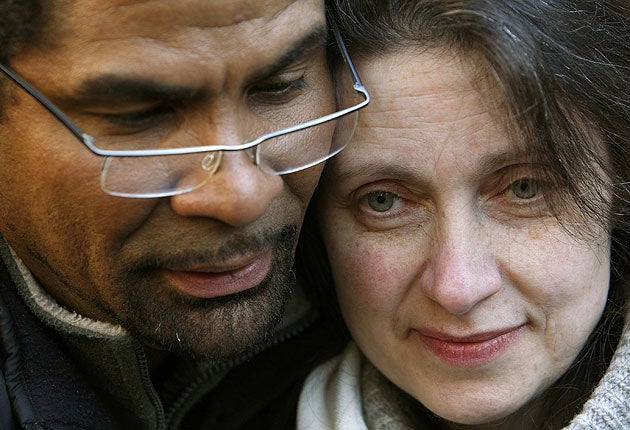MS sufferer Debbie Purdy in suicide plea to Law Lords

Your support helps us to tell the story
From reproductive rights to climate change to Big Tech, The Independent is on the ground when the story is developing. Whether it's investigating the financials of Elon Musk's pro-Trump PAC or producing our latest documentary, 'The A Word', which shines a light on the American women fighting for reproductive rights, we know how important it is to parse out the facts from the messaging.
At such a critical moment in US history, we need reporters on the ground. Your donation allows us to keep sending journalists to speak to both sides of the story.
The Independent is trusted by Americans across the entire political spectrum. And unlike many other quality news outlets, we choose not to lock Americans out of our reporting and analysis with paywalls. We believe quality journalism should be available to everyone, paid for by those who can afford it.
Your support makes all the difference.Multiple sclerosis sufferer Debbie Purdy went to the House of Lords today in her fight to allow her husband to help her commit suicide.
A panel of five Law Lords was told that if the UK law banning assisted suicide was not changed, she may be forced to end her life earlier than she planned.
And if she had to go to Switzerland, where assisted suicide is lawful, on her own, then her husband would not be there to comfort her at the end.
Ms Purdy has so far failed to secure a definitive court ruling that her husband, Cuban violinist Omar Puente, would not face prosecution if he helped her travel abroad to die.
Under English law, aiding and abetting suicide is a criminal offence punishable by up to 14 years imprisonment.
Lord Pannick QC, representing her, told the Law Lords headed by the former Lord Chief Justice, Lord Phillips that Ms Purdy, 46, was diagnosed with multiple sclerosis in 1995.
"She accepts there will come a time when her continuing existence will become unbearable for her, at which point she will wish to end her own life."
But he said that by that time she will be incapable of taking her own life without help and this would mean travelling abroad to a country where assisted suicide is legal.
"She will not be able to make the arrangements without the assistance of her husband who will consequently be at risk of prosecution.
"This places them in what the Court of Appeal described as an impossible dilemma."
Lord Pannick said both Ms Purdy and her husband wanted to know whether he is likely to be prosecuted and what criteria the Director of Public Prosecutions takes into account when deciding whether to bring a charge under the Suicide Act.
"While this will not provide a guarantee that the appellant's husband will not be prosecuted it will enable the appellant to make a better-informed decision.
"If the risk of prosecution is sufficiently low, she can wait until the very last minute before travelling with her husband's assistance."
He said if the risk was high, she would have to go earlier while she was still fit enough to travel without assistance.
"It is ironic that the policy designed to protect the sanctity of life will have the effect of shortening the life of terminally-ill persons such as Ms Purdy."
He added: "She would also not have the comfort of having her husband with her at the end of her life."
Before the case began today, Ms Purdy, who sat in her wheelchair next to her husband, said she was "excited and hopeful".
"We are not asking for a change in the law but a clarification of a law that exists.
"How can they refuse to do that, especially with all this stuff about MPs' expenses and whether they are out of touch with the people.
"Surely Parliament has to listen to the public more and be more responsive to what the public wants."
Both the High Court and Court of Appeal ruled it is up to Parliament to change the law and that, in specific cases such as that of Ms Purdy, prosecution and/or punishment of a helper was highly unlikely under the current code of practice for Crown prosecutors.
During the two-day appeal hearing at the highest court in the land, Ms Purdy's case is being opposed by Director of Public Prosecutions Keir Starmer QC, who argues that the general code of practice is sufficient and he should not be required to issue specific policy guidelines.
The hearing comes in the same week that the House of Lords itself, sitting as part of the parliamentary legislative process, is expected to debate the very issues at the heart of the Purdy case.
Lord Falconer, the former Lord Chancellor, is reported to be planning to put down an amendment to the Coroners and Justice Bill with the aim of removing the threat of prosecution from family members who accompany their loved ones overseas to euthanasia clinics.
He suggests that, to prevent abuse of the law and pressure being put on chronic sufferers to end their lives, two doctors should certify a patient is terminally ill and patients should declare their intentions before an independent witness.
Ms Purdy, from Undercliffe, Bradford, West Yorkshire, claims that lack of proper guidance infringes her Article 8 right to private and family life under the European Convention on Human Rights.
The DPP has refrained from prosecuting in around 100 cases where family members have helped terminally ill patients travel to Switzerland to end their lives.
Join our commenting forum
Join thought-provoking conversations, follow other Independent readers and see their replies
Comments